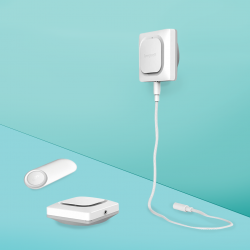Home Flooding Alarm Systems
While most homeowners dread home fires and try to do prevent them with working fire and smoke alarms, it would seem that water flooding is the actual culprit for most cases of property damage in households across the US. Even people who do not live in an area that is prone to flooding could eventually deal with the nightmare of a house flood caused by burst water pipes, clogged toilets, broken water heaters or supply lines beneath sinks, or split hoses tied to washing machines. If you have never truly taken all these elements into account when trying to figure out how to keep your home safe from various hazards, it is time you did. You should start by learning what a flood alarm is and why you should opt for a smart water sensor or a water leak detector app for extra safety.
Why Consider Smart Water Sensors and a Flood Alarm?
Flood alarms are just as important to install and use as fire alarms and smoke detectors. Water leak detectors work similarly to fire and smoke detectors and they should be installed in those areas of the house where water could wreak havoc. Some examples of vulnerable rooms of the house are the bathroom, the laundry room, the closet that hosts the water heater closet, the area beneath the kitchen sink, and others.
Water leak detectors and sensors are excellent as they help you keep a close eye on the potential presence of water in these areas where water should not be found. The same devices can also track a room's temperature and issue warnings when the freezing temperature is identified. This is an issue that could cause pipes to burst. The same smart water sensors can be used to notify homeowners of humidity levels that will trigger the alarm whenever the air reaches a humidity level that could cause mold. Some of these smart devices also come with additional features and they can turn off all the water supply in case of emergency. This is the role of the so-called shut-off valve triggered by smart sensors, even though most homeowners will usually have these parts installed by professional plumbers.
While most water leak detectors need to be fitted nearby faucets, water fixtures, and appliances that require water to work, there are also products that can prevent water leaks in a different manner. Namely, there are devices that will use sensors responsible for analyzing the entire water system right at the main water supply and search for any abnormalities such as leaks. In case leaks are found, they will automatically shut off the entire water supply in order to stop a potential flood.
If you are interested in buying a water leak detector app and device with similar features to the ones discussed above, you could also focus on finding one that comes with a smart valve feature. There are also water leak detectors apps that use special robo call options that can issue warnings whenever a new problem is identified in the home's water supply prior to the system being completely shut off. Some of these detectors are more complex and can handle more tasks than others, which also means they will tend to get pricier. Consider your exact needs and expectations and also keep in mind some of these models also charge subscription fees so you can fully benefit from all the available features. Budget accordingly and make sure you know what you are about to pay for.
Are DIY Home Water Leak Detectors A Good Idea?
If you are interested in a water leak detection system that can detect a leak for you and turn off the water supply without having to actually do any invasive cutting into the pipes, you can find plenty of these on the market. Expect to pay hundreds of dollars less to buy these systems and consider getting a system that can also be used together with different other smart devices inside the house. You could also opt for a wireless water alarm that will alert you by phone or SMS when the alarm is triggered, and, optionally, a siren will also be is activated.
How Do Water Sensors Work?
With the help of velcro strips, water sensors need to be set onto the ground or fitted beneath carpets and tied to a transmitter that allows a wireless connection. The transmitter and its cable must also be placed in a place where water will not be able to reach it. It is also possible to gradually add more sensors to such a system in case you need to supervise more than one location at a time using a control panel. Normally, the range between the control panel and a wireless water sensor is set at around one hundred meters or more, with the help of a device that can boost the wireless signal. Once the sensors detect water, the control panel will send out alerts to several key-holders via SMS and telephone.
Some of these wireless water sensors can also be used as smoke alarms, door chimes, burglar alarms inside the house, temperature monitors, or monitors that can supervise power failures, depending on the extra features the package you decide to buy comes with. Most of these systems can be used together with a couple of wireless sirens and programming them is hassle-free with the help of LCD screens and built-in keypads. Operating a wireless water sensor alarm can be done with the help of remote controls, as well as timers, keypads, APPs, and SMS. The main operating modes of these sensors are home and full arm, on site, interior, and exterior, on-site, entrance, or 24/7 with sirens.
